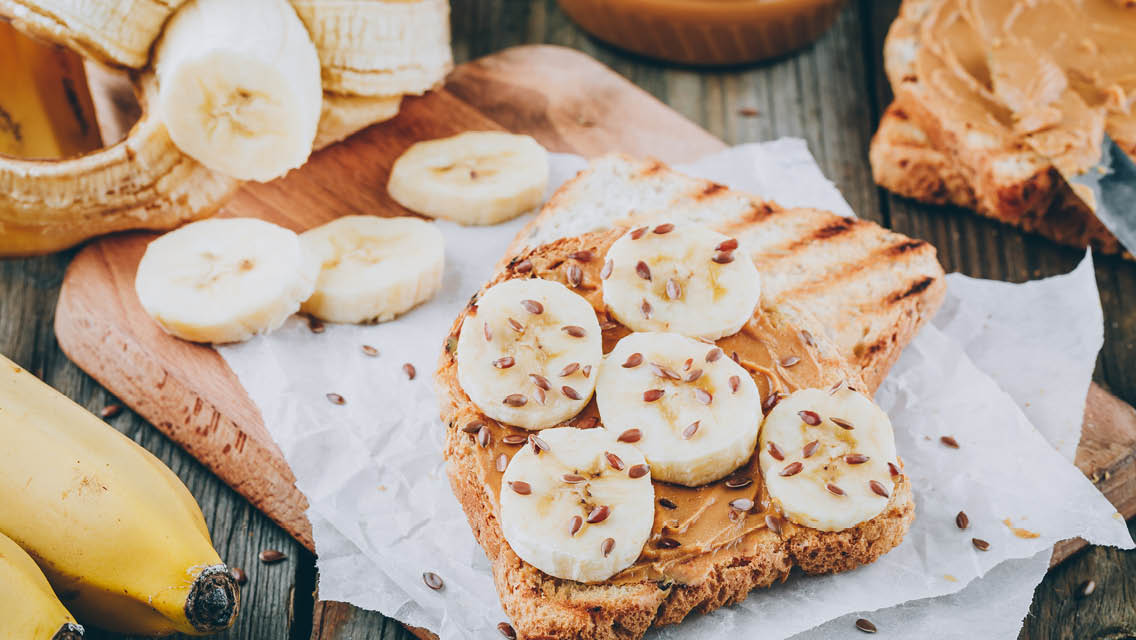Do you start the day feeling fatigued? Do you hit an afternoon energy slump that makes you want to take a nap under your desk? Or do you come home so exhausted you can’t imagine getting up and doing it all again tomorrow? If so, your lack of get-up-and-go may have something to do with the way you are fueling (or failing to fuel) your body.
When your system starts broadcasting signals that it’s having trouble keeping up with your energetic demands, that’s a good time to consider the role your dietary choices may be playing in creating or exacerbating that energy deficit.
If you’re cutting calories and skipping meals in an effort to control your weight – or depending on processed and fast foods, convenience-store snacks, caffeine, or candy to get you through your overly busy days – there’s a good chance you’re simply not giving your body the essential nutritional building blocks it needs to operate at peak capacity.
If you’re eating this way, you may also be creating a dietary vicious circle in which the nutritional deficits you’re inadvertently creating are making you even more vulnerable to other food-choice pitfalls.
“Many people think they have a willpower problem when really they’re experiencing a lack of nutrient-dense food,” says nutritional psychologist Marc David, MA, author of The Slow Down Diet: Eating for Pleasure, Energy and Weight Loss.
Fueling your engine with refined carbs and caffeine in the morning, for example, tends to contribute to afternoon blood-sugar crashes and midday cravings that, in turn, make it hard to pass up unhealthy snacks and too-heavy lunches. Eating a too-big or less-than-healthy lunch can leave you feeling brain-fogged, logy and desperate for sugar-fueled pep – sending you straight to the vending machine about 3 p.m.
You can turbocharge your day just by skipping the sugar cereal or pastry for breakfast and eating a veggie omelet instead, says Liz Applegate, PhD, senior lecturer in nutrition and director of sports nutrition at the University of California, Davis. “Getting some protein at every meal, rather than just carbohydrates, helps you feel more alert.”
Choosing smart midafternoon snacks – like fruit and nuts or veggies with almond butter can help you keep that good thing going. Giving your body nutrient-dense, whole-food fuel throughout the day not only helps you maintain your energy levels, it also makes you far less susceptible to the call of those fast-food drive-thrus and vending-machine indulgences that tend to bring you down.
But blood-sugar and macronutrient balance is only the beginning. If you are shorting yourself on key nutrients, like B vitamins and certain minerals, or if you’re overloading your system with late-night bingeing and foods that create digestive or immune distress, you may be interrupting your energy circuitry in more-complex ways. The good news is, once you understand how your current choices and habits might be undermining your energy, you’ll also know exactly how to turn your fuel crisis around.
Energy-Production Essentials
To stay energized, it helps to know how your body makes and captures energy. The real power lies in tiny structures inside your cells called mitochondria. (Learn more about these essential energy factories at “The Care and Feeding of Your Mitochondria“.)
“Most people don’t realize that we burn calories in our mitochondria with oxygen, just like in our car’s engine,” says Mark Hyman, MD, author of UltraMetabolism: The Simple Plan for Automatic Weight Loss. “The more mitochondria you have and the more efficiently they consume oxygen, the faster your metabolic rate, the easier your body burns calories, and the more energy you have.”
Exercising and eating breakfast both speed up your metabolic rate by helping your body produce more mitochondria and making the mitochondria you have more efficient. Mindless munching and yo-yo dieting, on the other hand, damage your mitochondria so you can’t turn calories into energy as effectively.
“Then two things happen: You gain weight and you get fatigued,” says Hyman. “You may also feel a few aches and pains. So you wind up in pain, fat and tired.”
Exercise – especially interval and strength training – when combined with high-octane eating, can help you boost the number and efficiency of your mitochondria even more dramatically.
4 Strategies for Optimizing Your Energy Levels
As Marc David sees it, “Most of us can have the energy we need right now. We just need to manage it better.”
Making a few small changes in the way you eat can free up reserves of energy you didn’t realize you had. For example, when you eat too much at once, eat too quickly, consume foods that don’t agree with you or eat too close to bedtime, these habits put stressful demands on your body that effectively drain valuable energy from your cells.
And when you skip meals, fail to drink enough water or go on crash diets, you starve your body at the cellular level, which can also quickly run down your energy stores. Relying on caffeine to fill the gap just makes matters worse. Caffeine produces energy by stimulating your central nervous system.
Not only can excessive caffeine intake overwork your glandular system, it can also quickly deplete vitamins B and C, magnesium, and several microminerals.
So rather than resorting to caffeine and sugar fixes to provide short-lived energy bursts, try tuning up your metabolism for the long haul with the following suggestions:
1) Pace Yourself.
Start your day with a little protein, like nut butters, eggs or a protein shake, to help balance your energy throughout the day, says Applegate. And drink plenty of water (several ounces per hour) to prevent dehydration, which can lead to fatigue and headaches.
Rather than depending on big meals, which divert blood flow to the digestive tract and, in turn, make you feel sleepy, eat several smaller meals throughout the day. Especially avoid large meals at bedtime. Your body will spend the night processing food rather than healing and repairing tissue.
Eating meals too fast can also send the body into a stress response. “Our bodies are not designed to take in a lot of food quickly,” says David. So the food just sits there in your stomach, the enzymatic activity in your entire gut stalls, and you lose more energy.
2) Focus On Digestion.
When you look at a juicy mango and feel your mouth start to water, it’s a reminder that your digestive system works more efficiently when you’re focusing on your meal rather than on the TV or the newspaper. Or, as Marc David puts it, “Our awareness of the meal increases our metabolism of the meal.”
3) Respect Your Endocrine System.
Eating a balanced diet supports your entire endocrine (glandular) system by keeping your hormones balanced. “Your hormones are directly connected to what you put in your mouth, and they profoundly impact your metabolism and available energy,” says Hyman, who recommends eating a diet rich in whole, organic fruits, vegetables, grains, legumes, beans, and fresh fish. Eating sugary, starchy, processed foods drains your energy by increasing insulin and cortisol, he notes. Eating unhealthy fats and drinking too much alcohol can destabilize your energy by creating excess estrogen and other hormones.
“Along with insulin and cortisol, your thyroid hormone is one of the big-three hormones that control metabolism and weight,” Hyman says. To keep your thyroid up to speed, he suggests cutting back on caffeine and eating more of the following: seaweed and sea vegetables (for iodine); sardines and salmon (iodine, omega-3 fats and vitamin D); Brazil nuts, scallops and herring (selenium); and dandelion and mustard greens (vitamin A).
4) Supplement Wisely.
While experts disagree about the role of supplements in supporting energy metabolism, most agree that getting inadequate nutrition is a surefire way to compromise energy and vitality. If you’re low on energy because you have a vitamin or mineral deficiency, you may benefit from taking a multivitamin, B vitamins, essential fatty acids, supergreens supplements, digestive enzymes, amino acids or other supplements recommended by your nutrition or healthcare adviser. But for maintaining balanced energy and overall health, nothing can beat the effectiveness of eating whole foods that are as close to nature as possible.
From tinkering with your diet to making larger adjustments in your lifestyle, you don’t have to make all these changes at once to enjoy a noticeable uptick in energy. Start by changing the things that seem doable now. And never underestimate what even a small change can achieve. “Energy is a lifestyle,” says Applegate. “And when you change how you eat, you change how you feel in your everyday life.”
Don’t Call It Snacking
Hunger Typically sets in every four hours or so, says Nancy Clark, MS, RD, author of Nancy Clark’s Sports Nutrition Guidebook. “So if you eat breakfast at 8 a.m. and eat lunch at noon, you’ll be ready for a second “lunch” at 4 o’clock in the afternoon,” she says.
That’s why mini-meals make good sense. Rather than eating three big meals and going hungry in between, Clark suggests eating about 300 to 400 nutritious calories per “meal,” and aiming for five to six such meals per day. Do this, and you’ll have the energy both to go to the gym after work and to cook a light, nutritious dinner when you get home.
The goal here is to never go hungry and to always make health-supporting choices. “Just take the word ‘snack’ out of your vocabulary,” suggests Clark. “Instead of candy bars and cookies, choose real food to stay energized.” Here are a few examples of mini-meals you might try:
- Yogurt, raisins and walnuts
- Trail mix of nuts, coconut and dried fruit
- Pear slices with nut butter and honey
- Apples and cheese sticks
- Sardines in mustard with whole-grain or flaxseed crackers
- Hard-boiled egg sliced over mixed greens
- Cup of vegetable stew or lentil soup
- Hummus wrapped in dark greens
- Cucumber, carrot or jicama spears with guacamole
- Sliced turkey and dried cranberries on brown-rice crackers
(Make your own protein bars with this advice and basic recipe from Melissa Joulwan, author of Well Fed: Paleo Recipes for People Who Love to Eat.)
Energy Drinks: Pep on Tap – or Chemical Buzz?
They’ve got aggressive names and snazzy cans, and they promise to give you a lift. No wonder energy drinks are so popular these days.
One more reason they’ve gained market share is that they are often promoted and perceived as “healthier” alternatives to soft drinks. In reality, though, most popular energy drinks are still very much like soft drinks. They may contain a bevy of supplemental herbs, nutrients and amino acids, but the primary ingredient that gives our central nervous system that characteristic buzz is still the same standby you find in most regular sodas, namely caffeine – or a compound such as kola nut or green tea that contains caffeine. Most energy drinks contain about 100 to 200 milligrams per can (more than the average cup of coffee), and they’re often loaded with sugar or artificial sweeteners to boot.
Energy drinks aren’t considered dangerous when consumed in moderation. Just be clear that any energy boost you’re getting is likely coming from caffeine, sugars or both, and not from any magical nutrient cocktail. And if you’re depending on energy drinks for your pep, you may be ignoring the root causes of an underlying energy deficit, including a need for rest. You could also be undermining your endocrine system with all that caffeine and sugar (see “Pep Talk” above), setting yourself up for worse trouble.
Experts like Liz Applegate, PhD, aren’t convinced by industry-generated research that suggests a performance benefit, either. “When you look at the research,” she says, “it was poorly done, and it didn’t support performance claims.” Applegate suggests scheduling regular breaks throughout the day and drinking water with a squirt of lemon or lime when you need to perk up your mouth and your brain.
This article originally appeared as “Eating for Energy.”





This Post Has 0 Comments